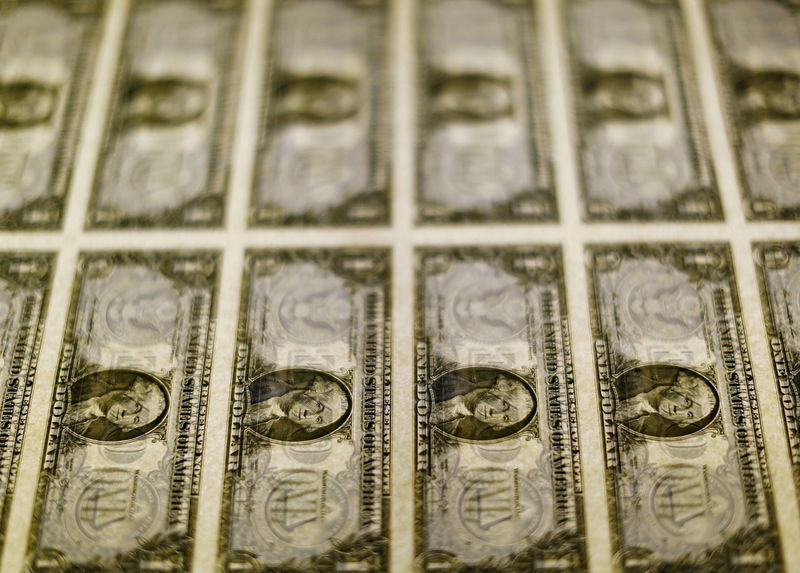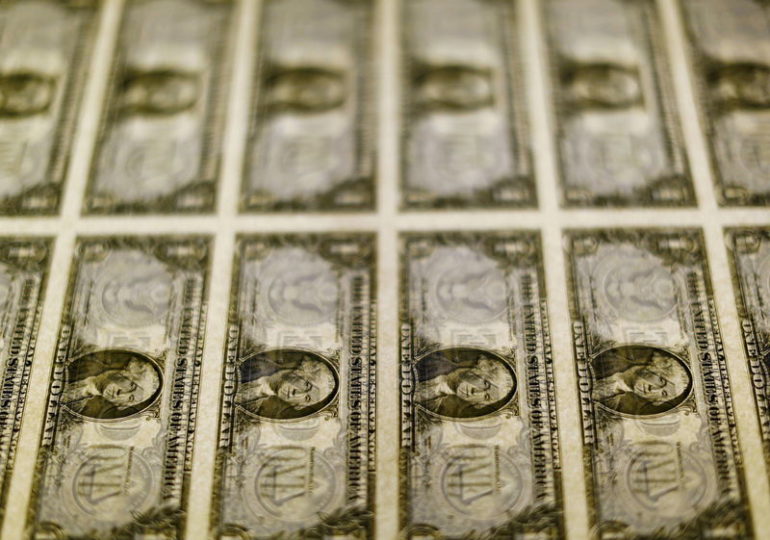 © Reuters.
© Reuters. By Geoffrey Smith
Investing.com — The dollar is starting the week little changed, with no real correction after lurching downward on Friday in response to the speech of Federal Reserve Chairman Jerome Powell.
The greenback had lost around half a percent against its major trading partners on Friday after Powell hinted that the central bank will start to withdraw its monetary stimulus this year, but stressed that that didn’t mean an accelerated timetable for raising interest rates.
By 2:45 AM ET (0645 GMT), the , which tracks the dollar against six advanced economy currencies, was effectively unchanged from late Friday at 92.707.
“We do not expect a tapering announcement in September but do expect it November, with the likelihood that the actual reduction in the pace of purchases begins in December,” said John Velis, foreign exchange strategist at Bank of New York Mellon, in a note to clients.
The closest Powell came to announcing any reduction in the Fed’s asset purchases, which have been running at $120 billion since spring 2020, was to say that “if the economy evolves broadly as anticipated, it could be appropriate to start reducing the pace of asset purchases this year.”
That was a much softer line than the one urged by a handful of regional Federal Reserve Presidents during the week, who had argued for tapering to start “sooner rather than later.”
The apparent reason for Powell’s caution was evident in Friday’s data for personal spending in July, in which spending on goods fell more than expected and spending on services rose less than expected as a result of the growing impact of the latest Covid-19 wave on consumer activity. Economists across Wall Street – not least those at Goldman Sachs – have been revising down their forecasts for third-quarter growth on the back of similar numbers since the start of the month.
The was one of the biggest gainers in early trade, hitting a three-week high of $1.1810 before retreating somewhat. The euro was supported by the strong performance of Olaf Scholz in Sunday’s televised debate between the major German parties’ leaders. The debate was the first to be held ahead of next month’s elections, and appears to have cemented the opinion poll lead of Scholz’s center-left SPD. As such, Germany is on course to push the center-right Christian Democratic Union out of power for the first time in 16 years. For markets, the most direct consequence of that is likely to be the abandonment of a fiscal policy that has kept government borrowing to a minimum since the Great Financial Crisis.
Spain’s inflation rate rose to 3.3%, according to figure just released, while German preliminary inflation data are due later in the day. Neither number is likely to shake the European Central Bank out of its taper torpor. Bank of France Governor Phlippe Villeroy de Galhau dominated early headlines with comments that there was no risk of overheating, or a sustained overshoot in inflation in the euro zone.
was becalmed by the closure of London’s forex market for the summer bank holiday, something likely to depress trading volumes around the continent. By 3 AM ET, it was up less than 0.1% against the dollar at $1.3769.
Fusion Media or anyone involved with Fusion Media will not accept any liability for loss or damage as a result of reliance on the information including data, quotes, charts and buy/sell signals contained within this website. Please be fully informed regarding the risks and costs associated with trading the financial markets, it is one of the riskiest investment forms possible.

